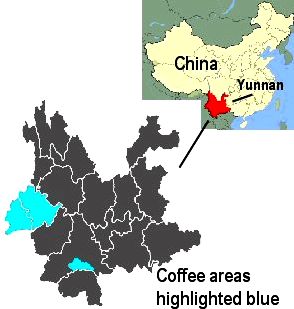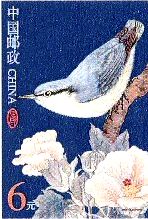 If you hear “China” and “coffee” stated inside the same sentence, it will always be in regards to the booming coffee market inside the typically tea-consuming country. Less well-known is the fact coffee is actually grown in China. It’s predominantly low-quality arabica found in instant coffee, grown entirely sun using high chemical inputs, as well as the Chinese government is strongly promoting the introduction of a lot of hectares of coffee production.
If you hear “China” and “coffee” stated inside the same sentence, it will always be in regards to the booming coffee market inside the typically tea-consuming country. Less well-known is the fact coffee is actually grown in China. It’s predominantly low-quality arabica found in instant coffee, grown entirely sun using high chemical inputs, as well as the Chinese government is strongly promoting the introduction of a lot of hectares of coffee production.
Background
Even though some robusta coffee is grown in China, in Fujian province and also on Hainan Island, this publish will focus on arabica coffee grown in Yunnan province.
Coffee remains grown in Yunnan since the late 1800s, but around the relatively small-scale. There’s an increase inside the late 1960s, but today’s Chinese coffee revival was orchestrated inside the 1980s with the Chinese government, the United nations, and at least one large multinational roaster. High import tariffs along with numerous potential new coffee consuming customers has motivated roasters to source coffee from the nation.
How coffee is grown in China
Coffee is grown in Yunnan in many regions: Dehong, BaoShan, Simao, and Ruili, mostly in western Yunnan over the border with Myanmar. Elevation differs from 900 to 1600 meters, generally around 1100 to 1200 m. Coffee farms change from small producers and huge condition-run or individually-owned plantations more than 2000 ha.
All the photographs I have encounter of coffee growing in China remains sun coffee. This can be a photo essay round the coffee harvest in China within the Siamaba farm in BaoShan, plus a photo in the 1200 ha ManLao River Plantation inside the Simao region.
Organic coffee production in China is really unknown. China seriously over-uses fertilizers, with coffee being one recipient. A present paper searching at different fertilization regimes for coffee in Yunnan province [1] determined that “higher than routinely applied levels of fertilization are necessary to optimize coffee plants photosynthetic acclimation and growth” — and photosynthetic acclimation, the paper explains, means the chance to resist full sun.
High fertilizer inputs aren’t the only issue. When I found no data relating particularly to coffee, China could be the world’s largest user and producer (and exporter) of pesticides, used once again to enhance yield, inside a huge cost for the atmosphere and human health.
Expansion, deforestation, and bio-diversity
Whereas China only produced about 3600 lots of coffee in 1997, last year this figure breached 28,000 tons on 2000 ha. In China’s usual grand form, this program is always to raise the coffee production spot to 16,000 ha over the following 15 years. China was already battling with severe deforestation, that is a significant symptom in Yunnan province. A paper discussing conservation there noted, “The most immediate way to obtain wealth in Yunnan could be the rapid liquidation of existing natural sources, particularly forests” [2].
The Yunnan Hogood (or Hogu) Coffee Company, for instance, grown nearly 4500 ha by 2007, recognise the business alone promises to have over 13,000 ha being created by 2012. They are to begin conveying coffee for the U.S. this year. They have contracted with 30,000 maqui berries maqui berry farmers, despite the fact that a government site (now defunct) pointed out that Yunnan Hogood is making these maqui berries maqui berry farmers wealthy, their per person annual earnings is $454. This may really be a marked improvement over previous incomes (Yunnan is one kind of China’s poorest areas), but it is still beneath the poverty level for China. Nestlé also touts their acquisition of technical help maqui berries maqui berry farmers in addition to their purchases provide steady earnings to local maqui berries maqui berry farmers. This can be probably true, however when maqui berries maqui berry farmers made an appearance to become helped to produce high-quality niche coffee, their incomes might be much greater. These two corporations, incidentally, will also be twisted in the trademark dispute.
 All this land conversion happens inside the most biodiverse regions in China. Yunnan comprises only 4% of China’s total area, but has more than 18,000 plant species and 1836 vertebrates (over 800 are wild wild birds) 112 of China’s bird species only appear in Yunnan [3]. The Yunnan hills are designated becoming an important endemic bird area by BirdLife Worldwide, where they condition that “loss of forest land here appears to get unquestionably the worst in China.” One of the restricted range wild wild birds discussed is just the near-threatened Yunnan Nuthatch, proven round the stamp, this option the endemic White-colored-colored-spectacled Laughingthrush. More fabulous wild wild birds of Yunnan is seen round the great photoblog of John and Jemi Holmes.
All this land conversion happens inside the most biodiverse regions in China. Yunnan comprises only 4% of China’s total area, but has more than 18,000 plant species and 1836 vertebrates (over 800 are wild wild birds) 112 of China’s bird species only appear in Yunnan [3]. The Yunnan hills are designated becoming an important endemic bird area by BirdLife Worldwide, where they condition that “loss of forest land here appears to get unquestionably the worst in China.” One of the restricted range wild wild birds discussed is just the near-threatened Yunnan Nuthatch, proven round the stamp, this option the endemic White-colored-colored-spectacled Laughingthrush. More fabulous wild wild birds of Yunnan is seen round the great photoblog of John and Jemi Holmes.
Niche coffee
China’s arabica coffee is many of the catimor variety, with a capacity coffee rust due to the robusta genes without anyone’s knowledge it’s generally considered low-quality rather than niche grade. Some older varieties can be found but they’re frequently impacted by rust rather than being promoted.
A few niche coffee roasters have a very presence in China, whatever the challenge to locate high-quality coffee and faced with consumers who overwhelmingly drink instant coffee (see below). Starbucks (which has committed $5 million to assist education efforts in China) has over 700 stores within the u . s . states, and sources its coffee from producers in Baoshan. The South in the Clouds blend includes Chinese-grown coffee and contains been offered in cafes in China. That debut incorporated a remark in the Starbucks spokesman the organization would “ultimately” choose to export Chinese coffee worldwide. However, supply presently isn’t high (or good?) enough to even think of a Chinese single origin offering (the South in the Clouds blend contains beans off their countries), and export depends on developing an origin of “superpremium” arabica beans.
Other U . s . States roasters with cafes in China include Beans & Tea Leaf and Canada’s Blenz Coffee. Roasters off their countries exist too, all attempting to steer a tea-consuming culture towards fresh ground coffee.
The part of instant coffee and Nestlé
Nestlé could be the big player in China, sourcing its Chinese-marketed Arabica coffee from the nation since 1997 and controlling as much as fifty percent the entire business within the u . s . states. The coffee Nestlé produces and sells in China is instant coffee, that’s frequently probably the most palatable to consumers in tea-consuming nations and dominates Chinese consumption. Include Kraft’s instant coffee, which two companies represent 70% in the Chinese coffee market.
Nestlé has invested over $5 million in technical help maqui berries maqui berry farmers in Yunnan province. They have sourced all their arabica beans from inside China since 1997 (probably blending with robusta), plus 2006 introduced 100% Yunnan coffee inside their in-country NESCAFÉ instant coffee. Given Starbucks’ inabiility to source only one origin Chinese coffee, this may mean Nestlé has twisted up plenty of producers, leases or owns their particular plantations, or perhaps the beans they source are simply suitable for immediate. The majority of the Chinese NESCAFÉ products aren’t just coffee, but pre-packaged coffee, sugar, and creamer, which are very famous China. No need high quality coffee of those beverages! For further on having less sustainability and quality in instant coffee, see these publish.
Coffee crisis, round 2?
One just have look next door from Vietnam to find out just what a no-holds-barred coffee production policy are capable of doing to world coffee prices and player livelihoods worldwide as well as the atmosphere. Regrettably, nearly exactly the same factors that precipitated the catastrophic coffee crisis in the late 1990s are once again in place: world development agencies plus a national government encouraging and subsidizing the planting of immeasureable coffee be responsible for a glut in supply, large multinational roasters eager to experience a way to obtain cheap mediocre coffee, and poor rural minority maqui berries maqui berry farmers wanting to obtain wealthy. After we have found, an end by world coffee prices due to oversupply from Asia means people and habitats suffer around the world.
Let’s hope history doesn’t repeat itself.
Related information:
- A great review of the coffee crisis at Coffee Geek — you select the parallels
- Chinese farms cause more pollution than factories (Protector Uk)
- Pesticide and environmental health trends in China.
- High pesticide residues threaten China’s food exports.
- Summary of Kunming Yunnan coffee by CoffeeCuppers.
- New You’ll be able to Occasions series on pollution crisis in China this installment on bio-diversity
[1] Cai, C.-T., Z.-Q. Cai, T.-Q. Yao, and X. Qi. 2007. Vegetative growth and photosynthesis in coffee plants under different watering and fertilization managements in Yunnan, SW China. Photosynthetica 45:455-461.
[2] Lan, D. and R. Dunbar. 2000. Bird and mammal conservation in Gaoligongshan Region and Jingdong County, Yunnan, China: patterns of species richness and nature reserves. Oryx 34:275-286.
[3] Yang, Y., K. Tian, J. Hao, S. Pei, and Y. Yank. 2004. Bio-diversity and bio-diversity conservation in Yunnan, China. Bio-diversity and Conservation 13:813-826.

Resourse: http://coffeehabitat.com/2010/02/coffee-growing-in-china/
Do Chinese People Drink Coffee?
Video COMMENTS:
Supergecko8: Sorry but as an Italian I have to say it, espresso master race!
Yu Lung Yip: Supergecko8 THIS!!! In this sentence you have come upon the essence of half the commentors in this very channel. Lmao
FoodforThought: English coffee is the best
Chabert Garmin: Go to an opium den next!
LolToalNoobs: Phillip Wong was she good?
Phillip Wong: You tell me, mother*fucker?
Sean Eskes: I was in these other channels that talks about China, and it seems that you guys are hated by Chinese people that frequent YouTube. They say you guys are worthless, have biased opinions and hate China. Why would people think that? Is it a thing in china that you cant talk bad and say the defects of where you live? They even say disgusting things that you guys just moved to China to feel superior, like royalty for being westerners.
Charly Maher: Sean Eskes suggest that everyone watch the videos and formulate their own opinion rather than be sheep. Every country has good and bad features and I found these 2 gentlemen call a spade a spade whether it's bad or good and they do have a lot of good to say. Unfortunately, sheep tend to repeat what they hear rather than say what they believe.
L Land: William Xue Thank you, my friend!
Bottlekiller: C-Milk seems to become more and more stoic in his attitude.\n\nProbably comes from being a father now.
